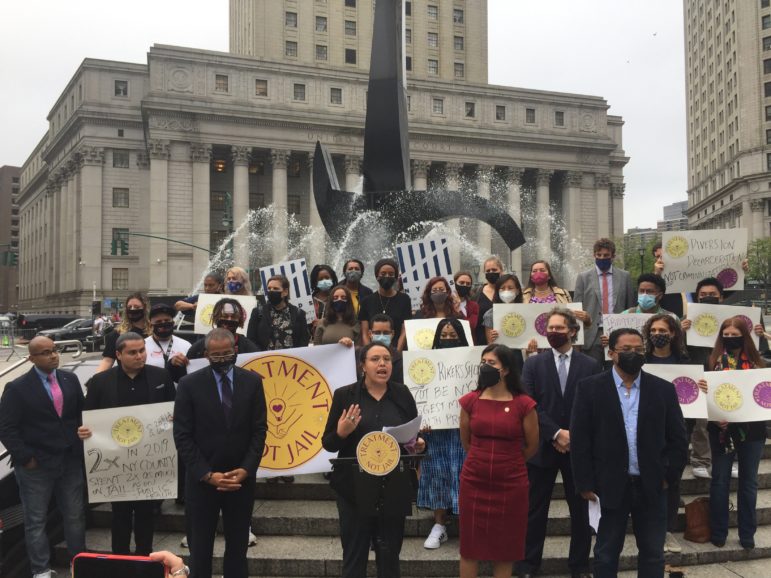‘I’m telling my story in the hope that fewer people like me, struggling with drug use and mental health issues, end up in here. I am writing to ask the New York State government to pass the Treatment Not Jail Act, which would mean people who get arrested because they really need help actually get treatment, and not jail.’

#HALTsolitary Campaign
Advocates and lawmakers held a rally Monday in Manhattan in support of the Treatment Not Jails Act, which Sen. Jessica Ramos says she plans to introduce in the next legislative session.I am writing from a crowded dorm on Rikers Island, waiting to go upstate for a burglary sentence, which could be up to four years. I’m telling my story in the hope that fewer people like me, struggling with drug use and mental health issues, end up in here. I am writing to ask the New York State government to pass the Treatment Not Jail Act, which would mean people who get arrested because they really need help actually get treatment, and not jail.
For as long as I can remember, my life has felt out of control. A lot of bad stuff happened to me as a kid, and I learned to get high a lot to try to escape my thoughts. Things spiraled, and I started stealing things from stores to get the money I needed to get high, but I never hurt anyone. I was arrested a lot and by the time I ended up in court I was always going through withdrawal.
Then a judge said she wanted me to get help, but there was a catch: the judge wanted me to plead guilty. Once I did that, she would release me to a residential drug treatment program, and I would have a social worker from an agency that worked with the court to monitor how I was doing. If I did well, she would dismiss my felony charges, and I wouldn’t go back to jail, but if I didn’t do well, I would get sentenced to a lot of jail time. I was scared but I really needed help, so I said yes.
I had a really hard time in the drug treatment program. A lot of stuff was coming up for me, and I always panic when I’m in a new place with no one I trust. I left, but I stayed in touch with my lawyer and my social workers, who tried to find another treatment center. I also tried a few times to stop using by going to detox, but it was all just too much. I ended up back in jail while I waited for the same judge to decide what would happen to me.
Through talking to my social worker, I realized what was happening. I told her about everything I went through as a kid, and how sometimes my thoughts keep me awake at night and nothing calms me down except using. She said it sounded like I might have something called Post-Traumatic Stress Disorder, and that I needed help with that in order to be able to stop using drugs.
The judge was angry that I didn’t stop using. She didn’t think I tried hard enough. She didn’t listen when my social worker tried to explain my mental health issues and asked for a psychiatrist to evaluate me, help me get medication and enter a new program. Because I had taken that guilty plea, there was nothing I could do. The judge sentenced me to prison time. Now I don’t know if I’ll ever get the help that I need. Instead, I’m afraid I’ll be back where I started, or worse off, when I get out.
 CityViews are readers’ opinions, not those of City Limits. Add your voice today!
CityViews are readers’ opinions, not those of City Limits. Add your voice today!
If I had gotten the treatment I need for my mental health, I might have been able to stay in the drug treatment program. If the judge had listened to my social worker, someone who knew me well and understood what was going on with me, things would have turned out differently. Finally, if I didn’t have to plead guilty in the first place, I could have had more of a voice in what was happening to me. But I signed over my life because I was so desperate to get treatment.
Getting help shouldn’t feel like that—it should feel like I’m making the choice to change my life because I’m ready to, and that I have the support that I need to keep trying even when it gets hard.
This is what the Treatment Not Jail Act will change. The law would allow people like me to get treatment for their mental health issues in addition to the substance use issues, without having to plead guilty first. It will mean judges need to listen to the social workers and treatment providers—people who know us well and listen to us, and who know a lot about mental health and drug use—when they make decisions about treatment. Treatment Not Jail will protect the rights of people in the legal system, like me, so we are seen as human beings. We’re not perfect, but we can change with a little support and a fair chance.
I know a lot of people are paying attention to the bad situation at Rikers right now and I hope they see this as a chance to keep people like me from ending up here in the first place.
Jiovani Sanchez is a Bronx resident who is currently incarcerated on Rikers Island.









2 thoughts on “Opinion: I’m Writing This From Rikers Island. I Hope You Get the Help I Didn’t”
Did this come from a cell phone? I’m working on research about contraband cell phones in prison. If so please get in contact.
no. it came from a letter